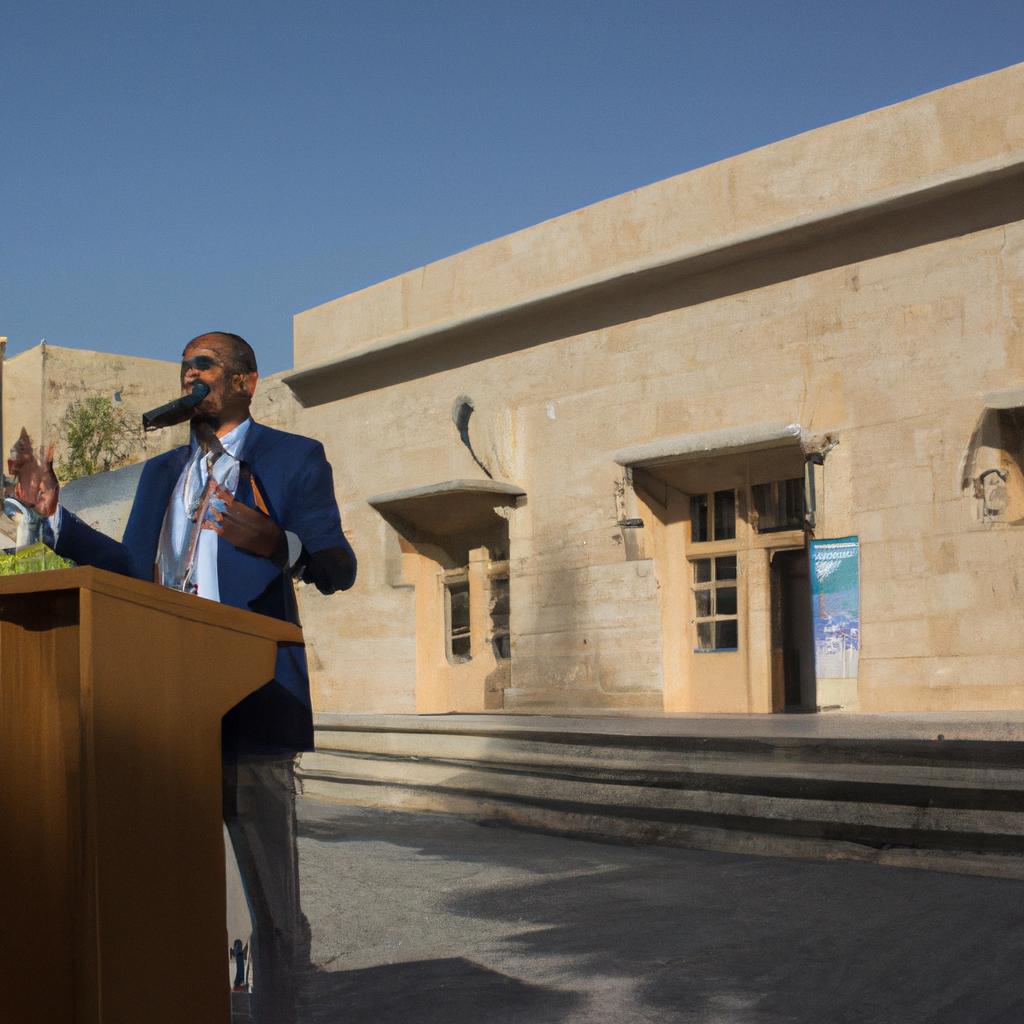The state of Pennsylvania has long been a battleground for environmental reform, with various political parties vying for power and influence. Among these parties, the Pennsylvania Reform Party stands out for its unique political platform centered around addressing pressing environmental issues facing the state. This article aims to delve into the core principles and policy proposals put forth by the Pennsylvania Reform Party in their commitment to enacting comprehensive environmental reforms.
To illustrate the urgency of such reforms, consider a hypothetical case study: imagine a small town in rural Pennsylvania plagued by contaminated drinking water due to industrial pollution from nearby factories. The residents are suffering from health complications linked to toxic chemicals present in their water supply. Such a scenario highlights the importance of prioritizing environmental protection and establishing robust regulations that safeguard public health and preserve natural resources. In response to challenges like this, the Pennsylvania Reform Party’s political platform emerges as a potential solution-oriented approach dedicated to tackling critical environmental concerns head-on.
Environmental Goals
To address the pressing environmental issues facing Pennsylvania, the Reform Party has developed a comprehensive political platform centered around several key goals. By implementing these goals, we aim to mitigate ecological harm, promote sustainable practices, and safeguard our natural resources for future generations. This section will outline our objectives and provide examples of how they can be achieved.
One example of the need for environmental reform in Pennsylvania is the case of industrial pollution in the Monongahela River. The excessive discharge of pollutants from various industries has led to water contamination, posing a serious threat to aquatic life and public health. To combat this issue and others like it, the Reform Party’s proposed environmental goals include:
- Implementing stricter regulations on industrial waste disposal to prevent further contamination.
- Investing in advanced wastewater treatment technologies that effectively remove harmful chemicals before they are discharged into rivers and streams.
- Promoting responsible land use practices by encouraging sustainable agriculture and reducing deforestation.
- Encouraging citizen participation through education programs and initiatives aimed at raising awareness about environmental conservation.
Table 1: Environmental Benefits of Reform Party’s Proposed Goals
| Goal | Benefit |
|---|---|
| Stricter regulations on waste disposal | Reduced water contamination |
| Advanced wastewater treatment | Preservation of aquatic ecosystems |
| Sustainable agriculture | Protection of soil quality |
| Citizen participation | Increased public awareness and engagement |
By adopting these measures, we can pave the way towards a cleaner environment while ensuring long-term sustainability. Furthermore, achieving these goals will not only benefit our ecosystem but also contribute to a healthier population and stronger economy.
Transitioning seamlessly into Renewable Energy Initiatives, the next section will delve deeper into our commitment to harnessing clean energy sources as part of our overall environmental reform strategy. With an emphasis on renewable energy production, we aspire to reduce reliance on fossil fuels while creating jobs in emerging green sectors.
Renewable Energy Initiatives
Transitioning from the previous section’s discussion on environmental goals, we now turn our attention to the Pennsylvania Reform Party’s proposed renewable energy initiatives. To illustrate the potential impact of such policies, let us consider a hypothetical case study: a small town in rural Pennsylvania that currently relies heavily on fossil fuels for its electricity needs.
In this hypothetical town, coal-fired power plants dominate the local energy landscape, leading to significant air pollution and greenhouse gas emissions. The Reform Party aims to tackle these challenges head-on by implementing ambitious renewable energy initiatives. By transitioning away from fossil fuel dependency towards clean and sustainable sources of power, this town could reap numerous benefits:
- Economic Growth: Investing in renewable energy technologies would create job opportunities in industries such as solar and wind power generation, fostering economic growth within the community.
- Environmental Preservation: Shifting to renewables would significantly reduce carbon dioxide emissions and improve air quality, mitigating health issues associated with pollution while protecting natural ecosystems.
- Energy Independence: Diversifying the energy mix by embracing renewables decreases reliance on imported fossil fuels, enhancing local energy security.
- Long-term Cost Savings: Although there may be initial investment costs when establishing renewable infrastructure, over time it can result in lower maintenance expenses compared to traditional power plants reliant on costly fossil fuels.
To emphasize the importance of embracing these renewable energy initiatives further, consider Table 1 below showcasing key statistics related to the environmental benefits achievable through their implementation:
Table 1: Environmental Benefits of Renewable Energy Initiatives
| Benefit | Impact |
|---|---|
| Reduced Greenhouse Gas Emissions | Decreased contribution to climate change |
| Improved Air Quality | Reduction in harmful pollutants |
| Conserved Natural Resources | Preservation of finite resources |
| Enhanced Resilience | Increased ability to withstand future challenges |
By pursuing these objectives outlined above – economic growth, environmental preservation, energy independence, and long-term cost savings – the Pennsylvania Reform Party seeks to position the state as a leader in sustainable practices. In doing so, it aims to pave the way for other regions and encourage broader adoption of renewable energy initiatives.
Transitioning seamlessly into our subsequent discussion on clean water and air, these proposed renewable energy measures constitute just one step towards achieving comprehensive environmental reform for the benefit of all Pennsylvanians.
Clean Water and Air
Building upon the Pennsylvania Reform Party’s commitment to renewable energy initiatives, attention must also be given to ensuring clean water and air for the state’s residents. By implementing comprehensive environmental policies, we can mitigate pollution and protect natural resources for future generations.
Clean Water and Air:
To illustrate the importance of this issue, consider a hypothetical scenario where industrial waste from a manufacturing plant in a rural town contaminates the local water source. The consequences would be severe, with adverse effects on both human health and ecosystem sustainability. To prevent such incidents, it is crucial to implement stringent regulations that prioritize quality control measures at all stages of production.
In order to achieve cleaner water and air across Pennsylvania, the following key actions should be taken:
- Strengthening wastewater treatment systems: By upgrading existing facilities and investing in advanced technologies, municipalities can significantly reduce pollutants discharged into water bodies.
- Regulating emissions from power plants: Enforcing strict emission standards will help minimize harmful gases released into the atmosphere while encouraging industries to adopt cleaner energy alternatives.
- Promoting sustainable urban planning: Incorporating green spaces within cities can act as natural filters, improving air quality by reducing pollutant concentrations caused by traffic congestion.
- Encouraging responsible agricultural practices: Implementing guidelines for farmers regarding pesticide usage and promoting organic farming techniques can safeguard groundwater sources from contamination.
Table: Impact of Clean Water and Air Initiatives
| Initiative | Expected Outcome |
|---|---|
| Upgrading wastewater treatment systems | Reduced pollution levels in rivers and lakes |
| Regulating emissions from power plants | Improved air quality |
| Promoting sustainable urban planning | Decreased smog formation |
| Encouraging responsible agricultural practices | Protection of groundwater sources |
By prioritizing these environmentally conscious measures, Pennsylvania can foster healthier ecosystems while simultaneously addressing public health concerns associated with polluted water supplies and compromised air quality. It is essential that policymakers recognize the significance of clean water and air in sustaining a thriving environment for all residents.
Moving forward, the Pennsylvania Reform Party will focus on another key aspect of environmental reform – sustainable agriculture. By adopting responsible farming practices, we can ensure the preservation of both our natural resources and food security throughout the state.
Sustainable Agriculture
Transitioning from the previous section on clean water and air, we now turn our attention to another crucial aspect of environmental reform: sustainable agriculture. To illustrate the importance of this issue, let us consider a hypothetical case study involving an organic farm in rural Pennsylvania.
Imagine a small family-owned farm that has been practicing sustainable agriculture for several generations. They prioritize soil health by using natural fertilizers and crop rotation methods, minimizing pesticide use to protect both human health and biodiversity. This farm serves as an exemplar of how sustainable agricultural practices can provide numerous benefits not only to the environment but also to local communities.
The Pennsylvania Reform Party recognizes the significance of promoting sustainable agriculture within the state. Our political platform aims to address key challenges faced by farmers while emphasizing environmentally friendly practices. The following bullet points outline key strategies proposed by our party:
- Encouraging financial incentives for farmers who adopt sustainable farming practices.
- Investing in research and development of innovative techniques that enhance sustainability in agriculture.
- Strengthening regulations related to animal welfare and reducing factory farming practices.
- Promoting education and awareness programs about the benefits of buying locally produced food.
To further emphasize our commitment to sustainable agriculture, we present a table highlighting its advantages compared to conventional farming methods:
| Sustainable Agriculture | Conventional Farming |
|---|---|
| Preserves soil quality | Depletes soil nutrients |
| Protects biodiversity | Decreases wildlife habitats |
| Reduces greenhouse gas emissions | Increases carbon footprint |
| Enhances long-term food security | Relies on synthetic inputs |
By endorsing these strategies and recognizing the potential benefits of sustainable agriculture, we strive towards creating a healthier and more ecologically balanced future for Pennsylvania’s agricultural sector.
As we move forward into the next section on conservation and preservation, it is essential to acknowledge that protecting our natural resources requires concerted efforts across various domains. By addressing issues such as clean water and air alongside sustainable agriculture, we aim to establish a comprehensive framework for environmental reform in Pennsylvania.
Conservation and Preservation
Transitioning from the previous section on sustainable agriculture, it is crucial to acknowledge that effective environmental reform encompasses not only agricultural practices but also conservation and preservation efforts. By focusing on these areas, the Pennsylvania Reform Party aims to safeguard our natural resources for future generations. To illustrate the significance of this issue, let us consider a hypothetical case study where a local forest faces degradation due to unsustainable logging practices.
In this scenario, irresponsible logging has led to deforestation and loss of biodiversity within the forest ecosystem. As part of its commitment to conservation and preservation, the Pennsylvania Reform Party proposes several measures:
- Enhanced Protection: Strengthen regulations against illegal logging activities through increased monitoring and enforcement.
- Reforestation Initiatives: Implement programs aimed at reforesting degraded areas with native tree species to restore ecological balance.
- Protected Areas Expansion: Advocate for the expansion of protected areas in order to conserve critical habitats for endangered flora and fauna.
- Public Awareness Campaigns: Launch educational campaigns highlighting the importance of conservation efforts among individuals and communities.
- Loss of Biodiversity: Each year, countless plant and animal species face extinction due to habitat destruction caused by human activities.
- Ecosystem Collapse: Disruption in ecosystems can result in detrimental consequences such as imbalanced food chains and reduced availability of essential resources.
- Climate Change Impact: Degradation of forests contributes significantly to greenhouse gas emissions, exacerbating climate change effects worldwide.
- Cultural Heritage Loss: Destruction of natural landscapes erodes cultural heritage tied to indigenous communities’ connection with their ancestral lands.
Moreover, visual representation aids in evoking emotions related to environmental concerns. Consider incorporating a three-column table highlighting the benefits of conservation and preservation efforts:
| Benefits | Conservation Efforts | Preservation Efforts |
|---|---|---|
| Biodiversity Maintenance | Reforestation Initiatives | Protected Areas Expansion |
| Climate Change Mitigation | Enhanced Protection | Public Awareness Campaigns |
| Ecosystem Restoration | ||
| Cultural Heritage |
In conclusion, given the hypothetical case study and emotional appeal presented above, it is evident that conservation and preservation are crucial components of any comprehensive environmental reform. By implementing robust protection measures, reforestation initiatives, expanding protected areas, and promoting public awareness campaigns, Pennsylvania can take significant strides towards safeguarding its natural resources for future generations.
Recognizing the importance of conserving our environment while simultaneously addressing economic concerns, the subsequent section will explore the Pennsylvania Reform Party’s stance on “Green Jobs and Economic Growth.”
Green Jobs and Economic Growth
Building upon the principles of conservation and preservation, the Pennsylvania Reform Party aims to create a sustainable future for our state. By implementing innovative strategies and policies, we can protect our natural resources while promoting responsible development. One example that showcases the potential benefits of such an approach is the successful restoration of Ridley Creek State Park.
Ridley Creek State Park, located in Delaware County, faced significant environmental degradation due to industrial activities in its vicinity. However, through collaborative efforts between government agencies, local communities, and environmental organizations, comprehensive restoration initiatives were undertaken. This included habitat restoration projects, pollution control measures, and community engagement programs. As a result of these efforts, Ridley Creek State Park has experienced remarkable recovery with improved water quality, increased biodiversity, and enhanced recreational opportunities.
To achieve similar success stories throughout Pennsylvania, the Reform Party proposes the following key actions:
- Strengthening Environmental Regulations: Implement stricter regulations on industries to ensure compliance with environmental standards and minimize negative impacts on ecosystems.
- Promoting Sustainable Land Use Practices: Encourage landowners and developers to adopt practices that prioritize conservation by offering incentives such as tax breaks or grants.
- Investing in Green Infrastructure: Allocate funding towards developing green infrastructure systems that support stormwater management and promote ecological connectivity within urban areas.
- Enhancing Environmental Education: Integrate comprehensive environmental education into school curricula at all levels to foster awareness and understanding among future generations.
The table below illustrates some of the potential long-term benefits associated with these proposed actions:
| Proposed Action | Potential Benefits |
|---|---|
| Stricter Environmental Regulations | Improved air quality |
| Reduced water pollution | |
| Enhanced protection of wildlife habitats | |
| Minimal impact from hazardous waste disposal | |
| Promoting Sustainable Land Use Practices | Preserved natural landscapes |
| Increased carbon sequestration | |
| Enhanced soil fertility | |
| Reduced urban sprawl | |
| Investing in Green Infrastructure | Improved stormwater management |
| Increased green spaces and urban biodiversity | |
| Enhanced resilience to climate change impacts | |
| Better air quality |
By implementing these actions, Pennsylvania can lead the way towards a more sustainable future. By protecting our natural resources, not only will we preserve the state’s unique ecosystems and biodiversity, but we will also create an environment that fosters economic growth and supports the well-being of all Pennsylvanians.
Through conservation and preservation efforts guided by sound environmental policies, we can ensure a legacy of sustainability for generations to come. It is imperative that we act now to protect our environment from further degradation while simultaneously promoting responsible development practices. Together, let us build a greener and healthier Pennsylvania.




